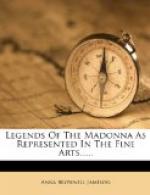In the first place, who were these Magi, or these kings, as they are sometimes styled? “To suppose,” says the antique legend, “that they were called Magi because they were addicted to magic, or exercised unholy or forbidden arts, would be, heaven save us! a rank heresy.” No! Magi, in the Persian tongue, signifies “wise men.” They were, in their own country, kings or princes, as it is averred by all the ancient fathers; and we are not to be offended at the assertion, that they were at once princes and wise men,—“Car a l’usage de ce temps-la les princes et les rois etoient tres sages!"[1]
[Footnote 1: Quoted literally from the legend in the old French version of the Flos Sanctorum.]
They came from the eastern country, but from what country is not said; whether from the land of the Arabians, or the Chaldeans, or the Persians, or the Parthians.
It is written in the Book of Numbers, that when Balaam, the son of Beor, was called upon to curse the children of Israel, he, by divine inspiration, uttered a blessing instead of a curse. And he took up this parable, and said, “I shall see him, but not now: I shall behold him, but not nigh: there shall come a star out of Jacob, and a sceptre shall rise out of Israel.” And the people of that country, though they were Gentiles, kept this prophecy as a tradition among them, and waited with faith and hope for its fulfilment. When, therefore, their princes and wise men beheld a star different in its appearance and movement from those which they had been accustomed to study (for they were great astronomers), they at once knew its import, and hastened to follow its guidance. According to an ancient commentary on St. Matthew, this star, on its first appearance, had the form of a radiant child bearing a sceptre or cross. In a fresco by Taddeo Gaddi, it is thus figured; and this is the only instance I can remember. But to proceed with our story.
When the eastern sages beheld this wondrous and long-expected star, they rejoiced greatly; and they arose, and taking leave of their lands and their vassals, their relations and their friends, set forth on their long and perilous journey across vast deserts and mountains, and broad rivers, the star going before them, and arrived at length at Jerusalem, with a great and splendid train of attendants. Being come there, they asked at once, “Where is he who is born king of the Jews?” On hearing this question, King Herod was troubled, and all the city with him; and he inquired of the chief priests where Christ should be born. And they said to him, “in Bethlehem of Judea.” Then Herod privately called the wise men, and desired they would go to Bethlehem, and search for the young child (he was careful not to call him King), saying, “When ye have found him, bring me word, that I may come and worship him also.” So the Magi departed, and the star which they had seen in the east went before them, until it stood over




